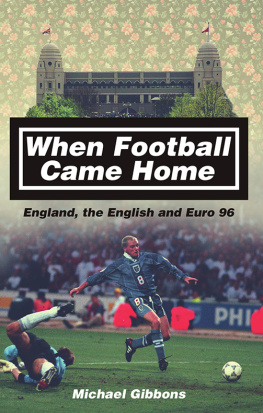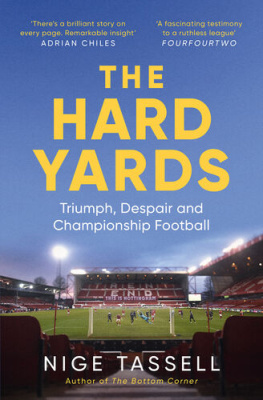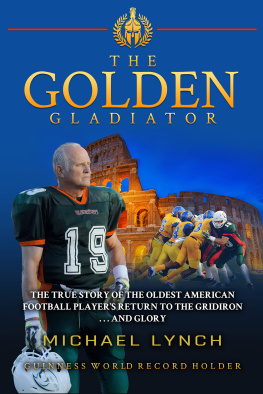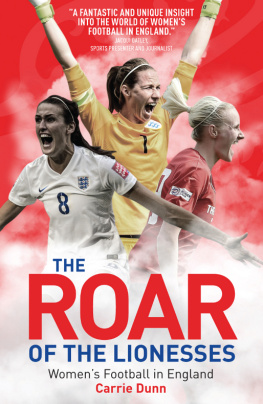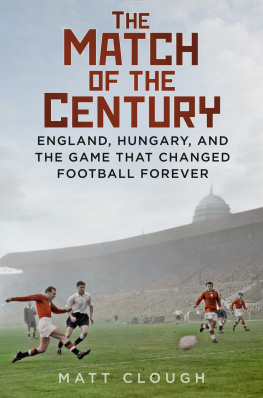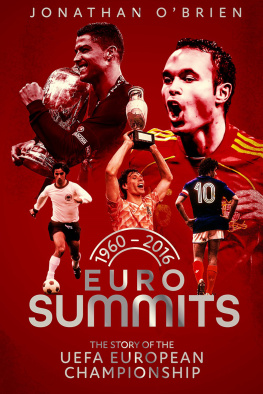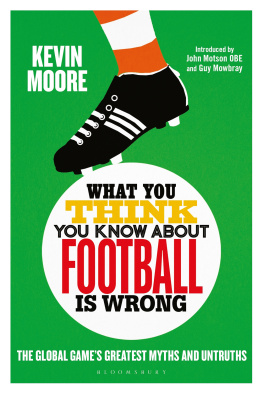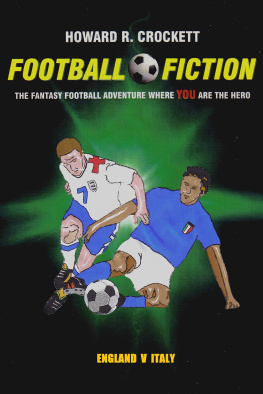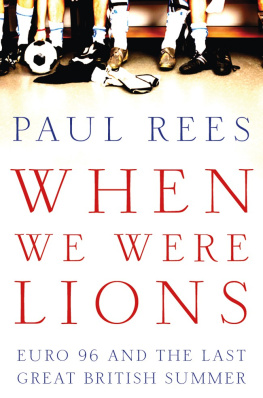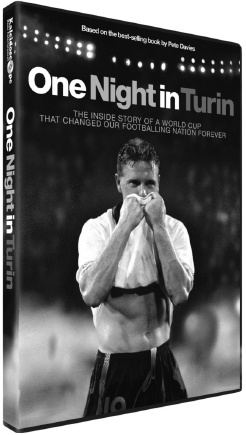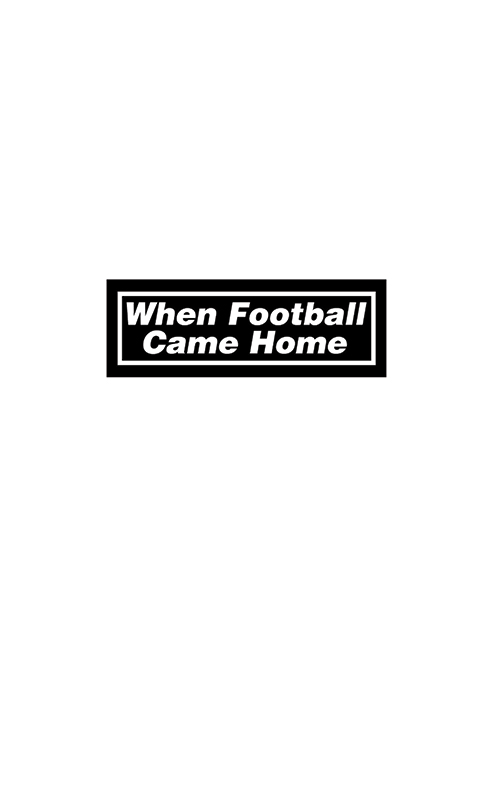First published by Pitch Publishing, 2016
Pitch Publishing
A2 Yeoman Gate
Yeoman Way
Durrington
BN13 3QZ
www.pitchpublishing.co.uk
Michael Gibbons, 2016
All rights reserved under International and Pan-American Copyright Conventions. By payment of the required fees, you have been granted the non-exclusive, non-transferable right to access and read the text of this e-book on-screen. No part of this text may be reproduced, transmitted, downloaded, decompiled, reverse-engineered, or stored in or introduced into any information storage and retrieval system, in any form or by any means, whether electronic or mechanical, now known or hereinafter invented, without the express written permission of the Publisher.
A CIP catalogue record is available for this book from the British Library
Print ISBN 978-1-78531-128-4
eBook ISBN: 978-1-78531-176-5
--
Ebook Conversion by www.eBookPartnership.com
Contents
Acknowledgements
Thanks, for everything, to my Mum and Dad, our Louise and our Emily, and all of my friends.
Special thanks to Paul and Jane Camillin at Pitch Publishing, Duncan Olner at Olner Sport Pro Media, Gareth Davis, Dean Rockett, Derek Hammond, Alex Dyakowski, Ewan Gault and Rob Langham.
For sending me on my way, I can hardly thank Rob Smyth and Lars Eriksen enough.
And thanks to you, for reading this.
Introduction
A T 9.37pm on 26 June 1996 I was standing in the lobby of a hotel in Cardiff. There were only a few other English people in the sizeable huddle. An unfortunately-timed dinner and dance, that our school had arranged to celebrate the end of the sixth form, was going on somewhere else in the hotel. I was staring at a small television screen behind the reception area when Paul Gascoigne just fail to connect with Alan Shearers cross against Germany in the semi-final of Euro 96. The pictures had no accompanying sound. Watching that moment with no Barry Davies or crowd noise to help rationalise the experience felt surreal, like seeing the Zapruder film for the first time. Only the reactions of the people gathered around me broke the silence.
About four months later I discussed that moment with a new friend Id made at Swansea University. Rainer was from Germany, a Bayern Munich fan, and we played inter-mural football together in our first few weeks. When I missed a penalty in our very first game he shouted Southgate! Southgate! down the pitch at me. Later we had a laugh about our game, and the one that had taken place in the summer. Rainer told me that hed been a little nervous about coming to Britain, given what had happened that night. But he had also been excited.
In 1996 then the country the world even was under the spell of Cool Britannia, a movement spearheaded by a motley collection of figures from the British arts. They had gathered under one roof with a Union Jack flying from the mast, and embarked on a lost weekend that went on for around three years. Hindsight often judges the era unfavourably, but a generation that had emerged from the rubble of the 1980s in Britain helped to send an undeniable wave of optimism through the country. For a short while, anything seemed possible.
Even winning an international football tournament. Euro 96 took place in England at the height of the festivities, just as the 1966 World Cup had arrived during swinging London. The hosts had just over two years to get ready, and watched their efforts crescendo in the same summer as this great cultural resuscitation reached its peak. It just seemed that all those discussions youve ever had Wouldnt it be great if...? former loaded editor James Brown recalled in Live Forever. Well, thats what happened in the 90s. If happened. At the European Championship, it was more a case of if only.
This is the story of England, and Euro 96.
1
And San Marino have scored!
D AVIDE Gualtieri is 45 years old now, and works as a computer salesman. Every November, regular as clockwork, he fields a flurry of interview requests before returning to anonymity. He is the international equivalent of the non-league amateur that once came to the attention of everyone in the third round of the FA Cup. Gualtieri still keeps Stuart Pearces shirt that he swapped for his own at the end of the game. There is a plaque at the offices of the football federation of San Marino dedicated to his achievement. His name haunts English football. One night in Bologna, and that goal.
If 1992 was an annus horribilis for the Queen, its as well for her that she was hardly likely to seek solace in the England national team the following year. Their final game of 1993 was against San Marino, a tiny republic in northern Italy with a population that wouldnt half-fill Wembley Stadium. They had never won a match. In the 22 internationals of their brief history San Marino had scored just two goals. England had been expected to face them with qualification for the 1994 World Cup already secured. However Englands stock had fallen so far they had become a laughing stock.
England had stumbled so badly in Group 2 qualifying that they needed to beat San Marino by seven clear goals and hope that Poland, who had nothing to play for but personal pride, could beat Holland. Due to fears over English hooliganism the game was switched from San Marinos home ground in Serravalle to the Stadio Renato DallAra in Bologna in northern Italy. Needing to thump minnows in a neutral venue and rely on favours from elsewhere. That it should come to this.
There was a cruel irony in England meeting their fate there. Just over three years earlier England had scored one of the most important goals in their history at that very stadium. In the last minute of extra time Paul Gascoigne floated a free kick over the Belgian defence to David Platt. He let the ball drop over his shoulder before hooking a volley past Michel Preudhomme to put England in the quarter-finals. After a heart-stopping game against Cameroon which they barely survived there followed an almost inevitably honourable defeat to West Germany in Turin. It was a campaign that had a huge knock-on effect for English football.
On their return to Luton airport a few days after losing the third/fourth place play-off to Italy, the England players were greeted with the fanfare normally reserved for world champions. As the open-topped bus weaved through the appreciative throng in Luton, entertained by Gascoigne wearing a fake plastic belly and breasts, there was the sense that the celebrating wasnt entirely unjustified. Apart from taking England to within a couple of penalty kicks of a World Cup Final, Bobby Robson had left Graham Taylor a good, proven international squad, which had created a powerful sense of hope.
Englands international horizons have rarely looked as bright as they did when Taylor took over the job in 1990. It didnt last. Peter Shilton and Terry Butcher retired straight away. John Barnes and Gascoigne had perpetual injury problems, sidelining them from the action for lengthy spells. Age and injury had also pushed Bryan Robson to the end of the road. These factors are professional hazards for an international manager, but Taylor also weakened his hand significantly by making the decision to drop Peter Beardsley and Chris Waddle from the squad after a few games. The latter in particular was a staggering exclusion, given that he had propelled Marseille to a European Cup Final in 1991. Established world stars were replaced by the likes of Andy Sinton, Tony Daley, Geoff Thomas and Carlton Palmer.

